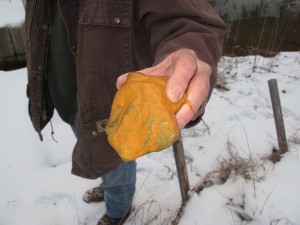Environmentalists Throw Cold Water on Efforts to Amend Good Samaritan Act
-
Susan Phillips

Susan Phillips / StateImpact Pennsylvania
A rock pulled from the bottom of a creek in Tioga County is covered in orange slime, resulting from iron sulfide in mine water drainage.
Earlier this week, we told you about efforts to use polluted water from abandoned mines to frack natural gas wells. Some energy companies say they’d be happy to use mine drainage rather than fresh water but they want to be sure that they won’t also get stuck with liability for cleaning up the mine water forever.
Lawmakers are debating Senate Bill 411, which would ease those liability concerns. But there’s growing resistance from environmentalists who say the bill is too broad.
Senate Bill 411 would amend the state’s Environmental Good Samaritan Act. That law, passed back in 1999, is meant to protect volunteer watershed groups working to clean up the more than 4,000 miles of lifeless streams resulting from the state’s legacy of coal mining. The fear is that another statute, Pennsylvania’s Clean Streams Law, could leave these volunteers open to third-party lawsuits should something go wrong during their clean-up efforts.
Some gas producers are already using abandoned mine drainage to frack wells. Our earlier story highlighted Seneca Resources activities in Tioga County. That company says it’s not worried about liability issues. So is this a solution in search of a problem?
Attorney Peter Fontaine, who represents gas drillers, says the Clean Streams Law could put drillers at risk for cleaning up polluted mine drainage in perpetuity if they use it to frack wells. Fontaine says SB 411 is an improvement because it eases liability for any person using the drainage water for beneficial purposes.
But attorney Jordan Yeager, who has represented environmental groups opposed to the bill, says SB 411 goes way beyond removing liabilities to encourage the use of mine water to frack.
“This isn’t aimed at addressing that,” says Yeager. “This is identifying a whole new set of off-site uses and would provide immunity without any requirement that they treat the water to any standards prior to moving it off-site. So if I irrigate a field with [abandoned mine drainage] I’m immune from liability. It’s bizarre.”
Beneficial Uses
Although the precursor to the bill specified the use of mine water to frack, this new bill, introduced by Sen. Richard Kasunic (D) from Somerset and Fayette counties, adds additional “beneficial” uses such as irrigation and agriculture.
It’s important to point out here that the polluted water pouring from the state’s abandoned mines will do so forever. As long as it rains, that water will seep into the abandoned mines, forming mine pools, where it absorbs minerals exposed by coal mining. The water flowing out of these abandoned mines will need to be treated in perpetuity. So simply withdrawing mine water does not clean it up. Treatment systems installed near the site of the mine discharge will have to be maintained forever. And that costs millions of dollars.
On the one hand, some industry representatives fear that if a company simply touches this drainage through water withdrawals, the company could be held liable under the Clean Streams Law. But how far should the law go to remove liability if the driller is moving the water off-site?
Tracy Carluccio with the Delaware Riverkeeper Network says this proposal is a perversion of the Environmental Good Samaritan Act.
“There are certain requirements in place now under the Good Samaritan Act that insure that those operating those systems still have to meet,” says Carluccio. “They have to improve water quality and not make the pollution worse.”
How Much Immunity?
The Good Samaritan Act does not allow anyone to simply set up a treatment system. The watershed groups still have to work out a plan with the Department of Environmental Protection. And they are not immune from liability if any additional environmental damage occurs that involves recklessness or gross negligence.
Carluccio worries that SB 411, as currently written, could grant immunity to gas drillers all the way through the fracking process, if they use abandoned mine drainage. Attorney Jordan Yeagar agrees with that assessment.
“That’s the intrinsic logic of the language being utilized in the bill,” he says.
The volunteer watershed groups are hoping industry will help pay for their projects. But there’s nothing in SB 411 to fund any perpetual treatment systems for the mine water that continues to flow downstream.
Environmentalists are split on the matter. Some environmentalists, such as the Delaware Riverkeeper Network, oppose using the mine water to frack, saying it’s making a dirty process dirtier. Mine water reclamation groups welcome the involvement of industry. Others see some benefits, but are raising red flags. John Quigley is the former head of the state Department of Conservation and Natural Resources.
“It is better to use lower-quality water than fresh water [to frack],” says Quigley. “That narrow activity is a good thing, and it should be encouraged. But the question is, are they going to go overboard and create other problems?”
Quigley says simple water withdrawals will not clean up the thousands of miles of abandoned mine water.
“It’s a Band-Aid,” he says.
It looked like Senate bill 411 was moving quickly toward a vote this week. But it was tabled on Wednesday and may sit a while before going before the full Senate.
















